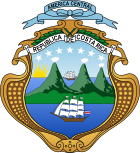
Back سياسة كوستاريكا Arabic Държавно устройство на Коста Рика Bulgarian Política de Costa Rica Spanish Politique au Costa Rica French Politica della Costa Rica Italian Política da Costa Rica Portuguese 哥斯達黎加政治 Chinese
 |
|---|
|
|
The politics of Costa Rica take place in a framework of a presidential, representative democratic republic, with a multi-party system. Executive power is exercised by the president and their cabinet, and the President of Costa Rica is both the head of state and head of government. Legislative power is vested in the Legislative Assembly. The president and 57 Legislative Assembly deputies are elected for four-year terms. The judiciary operates independently from the executive and the legislature, but is involved in the political process. Costa Rica has a strong system of constitutional checks and balances.[1] Voting is compulsory de jure, but this is not enforced.
The position of governor in the seven provinces was abolished in 1998.[2] There are no provincial legislatures. In 2009, the state monopolies on insurance and telecommunications were opened to private-sector competition. Certain other state agencies enjoy considerable operational independence and autonomy; they include the electrical power company (Instituto Costarricense de Electricidad), the nationalized commercial banks (which are open to competition from private banks), and the social security agency (Caja Costarricense del Seguro Social). Costa Rica has no military but maintains a domestic police force and a Special Forces Unit as part of the Ministry of the President.
The Economist Intelligence Unit rated Costa Rica a "full democracy" in 2023.[3] According to the V-Dem Democracy indices Costa Rica was in 2023 the most electoral democratic country in Latin America.[4]
- ^ "hup.sub.uni-hamburg.de".
- ^ "www.nacion.com".
- ^ Democracy Index 2023: Age of Conflict (PDF). Economist Intelligence Unit (Report). 2024. Archived (PDF) from the original on 2024-06-09. Retrieved 2024-07-22.
- ^ V-Dem Institute (2023). "The V-Dem Dataset". Retrieved 14 October 2023.